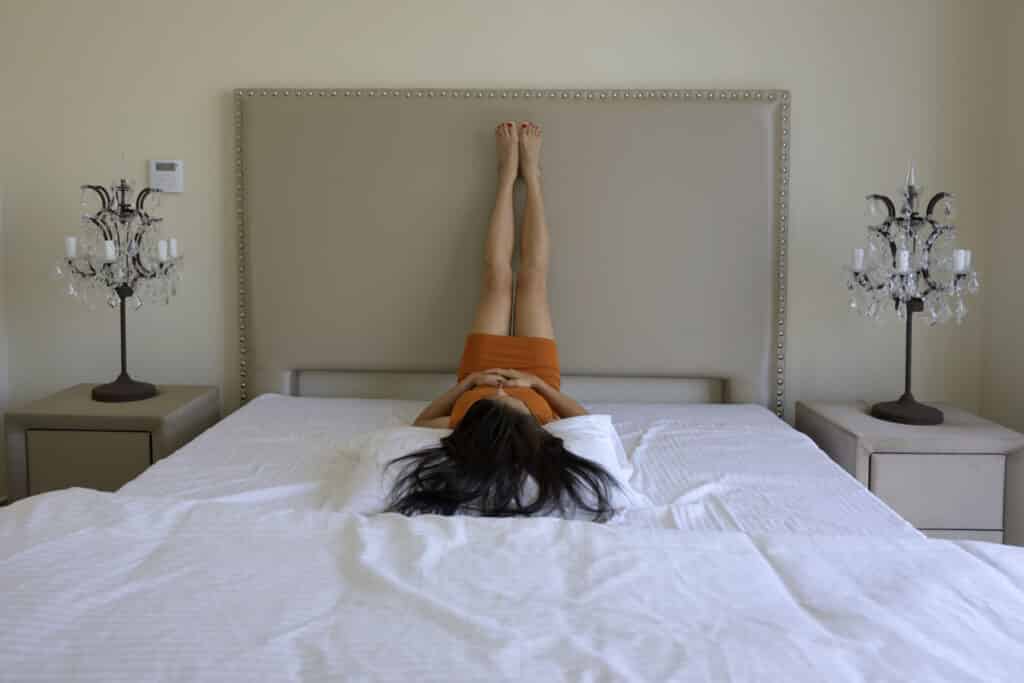Did you know that sleeping with your legs elevated can offer a number of health benefits? It turns out that this simple trick can help improve blood circulation, reduce swelling and even help against restless leg syndrome. Keep reading to learn more about these benefits and how you can start getting the most out of your sleep today!

Benefits of sleeping with your legs elevated
Sleeping with legs elevated has a range of benefits associated with increasing blood flow around your body and proper spinal alignment.
Alleviates strain on the heart
Proper blood circulation is essential for any body part-and this has a direct impact on your heart. Regularly elevating your legs at night will help reduce strain on the heart and reduce the risk of cardiovascular diseases such as stroke and myocardial infarction (heart attack).
Sleeping with your legs raised above your heart level will actually help older deoxygenated blood move back towards your heart and be processed through the heart. This is less work for your heart than pumping the blood at an increased rate as gravity is doing some of the work.
Better blood circulation
Sleeping with your legs elevated can greatly improve blood flow through your body. When you elevate your legs it creates a direct increase in the amount of blood that is allowed to flow into your leg veins and back towards the heart for processing.
Prevents deep vein thrombosis
Deep vein thrombosis (DVT) occurs when blood clots become lodged in your veins. If this continues for a long period of time it can cause serious health problems and even death.
Sleeping with legs elevated helps maintain blood flow when someone is bed-ridden for long periods and can therefore help with DVT prevention.
Read also: Should I sleep in compression socks?
Reduces varicose veins
Varicose veins, or spider veins, are a buildup of enlarged and twisted veins and can cause serious pain. Sleeping with your legs elevated reduces the risk of varicose veins by increasing blood flow back towards the heart.
Reduces swelling and water retention
Sleeping with your legs elevated is an excellent way to reduce or prevent leg swelling at night, which is often the result of sitting or standing for long periods of time. Additionally, water retention is a common cause of swollen feet (called peripheral edema) and this can be reduced or prevented by elevating your legs at night.
Improves spine alignment
Sleeping with your legs elevated has a beneficial effect on back and spine alignment. When you lay down for sleep with your legs in the normal position it can put unnecessary pressure on your discs and this is particularly true when you are pregnant.
A leegs elevated position will help maintain proper spinal alignment by reducing the pressure placed on the lower back during sleep.
Read also: Should I sleep with my knees raised.
Reduces lower back pain
Sleeping with your legs elevated reduces the amount of stress on your lower back and spine, which often results from sleeping positions that put added pressure on these areas. Leg elevation removes pressure that sleeping with your spine in a non-neutral position can cause, thereby reducing lower back pain.
Promotes recovery after sports injuries
Sleeping with your legs elevated can also promote recovery after sports injuries. This is because it reduces the amount of pressure that is put on the injured area while you are sleeping.
Negatives of sleeping with your legs elevated
Can be uncomfortable at first
Sleeping with your legs elevated can be uncomfortable to start. You might find that you wake up more frequently and feel like your legs are falling asleep or numb. To overcome this discomfort it is recommended that you slowly increase the incline of your legs over time until you reach a comfortable height level.
Decreases effectiveness of body temperature regulation
While sleeping with your legs elevated can be a powerful method of regulating blood flow and reducing swelling it also reduces the effectiveness of your natural body temperature regulation. This will mean you might have to resort to other methods for regulating temperature such as using a fan or air conditioning unit in your room.
Can cause overheating
If you suffer from hot flashes or have a naturally high body temperature you could find that sleeping with your legs elevated causes you to overheat. This would negate the benefits of blood flow regulation and can actually make it harder for you to fall asleep.
Can cause leg cramps
Leg cramps are caused when your muscles suddenly spasm or contract, often at night during sleep. Sleeping with your legs elevated can cause leg cramps because it increases the amount of time your legs are in a flexed position. This results in muscles being overworked and weakened over time, which can lead to more frequent leg cramping during nights.
Can worsen heartburn and acid reflux
Sleeping with your legs elevated is not recommended for people who suffer from heartburn or acid reflux because it can exacerbate these conditions by slowing down the digestive process.
Can place extra pressure on the hips and tailbone
Sleeping with your legs elevated can also cause you to experience pain in your hips, tailbone and thighs if you are not used to this position. The reason why is that the body gradually adapts to sleeping with your legs elevated until it becomes comfortable. If you are not used to sleeping in this position it can place too much pressure on your hips and tailbone while you sleep.
Difficult for side sleepers
Sleeping with your legs elevated can be difficult for people who sleep on their sides, or who prefer a sleep position which is not on their back. Attempting to raise your legs with one leg on top of the other is likely to be uncomfortable for your hips and the muscles in your lower body, and can place too much pressure on the joints of the supporting leg.
Can increase snoring
Sleeping with your legs elevated can result in increased snoring because of its effects on the airways. This is because it can relax your muscles more than normal while you are asleep, which causes your throat muscles to move more and result in snoring.
Difficulties falling back to sleep
Sleeping with your legs elevated can result in an increased number of times that it takes you to fall back to sleep after waking up during the night. This is because your legs and hips could feel uncomfortable due to their elevated position and it can prevent you from getting a full 8 hours of uninterrupted sleep.
Doesn’t work for everyone
It isn’t recommended that people suffering from leg cramps or overheating try sleeping with their legs elevated as this position might make these symptoms worse. Also, this method doesn’t work for everyone because it is dependent on whether or not you personally find it comfortable.
Ways to comfortably ellevate legs while sleeping
Using pillows to elevate your legs
Sleeping with legs elevated is relatively easy to achieve using pillows. Simply place the pillows under our bend legs, against the underside of your thighs. Rolled up towels can work for these purposes too. However, you will not get a particularly high ‘lift’ with standard pillows or towels.
Using a wedge pillow
If you often wake up with leg cramps, and find it uncomfortable to sleep with your legs elevated because of the angle required, you could try using a wedge pillow. A wedge pillow is normally used for stomach sleeping but can also be effective when placed under your legs while sleeping on your side or back to elevate them.
Using a bed wedge
A bed wedge is much like a small pillow that slopes upwards from the middle so your body weight causes you to slide down it and off the back of it. If you place this under your legs while sleeping on your side, it should elevate them and prevent any uncomfortable pressure building in the lower back, hips or thighs.
Sleeping on an adjustable bed
If you find that you aren’t able to get leg elevation right using pillows or towels, you can use an adjustable bed to adjust the position of your entire body, including sleeping with your feet elevated. Adjustable beds have several advantages, including being able to be customized for a range of sleep positions and the ability to lower the entire bed to make it easier to get on and off it.
Conclusion
Sleeping with your legs elevated can be an effective way to combat fatigue and boost energy levels, but it doesn’t work for everyone. The best sleeping position for you may depend on the type of mattress or bed that you own. If you’re not sure what’s right for you, consult a chiropractor who specializes in ergonomics; they’ll help find the best solution to ensure that no matter how tired you are, your body stays supported throughout the night.
